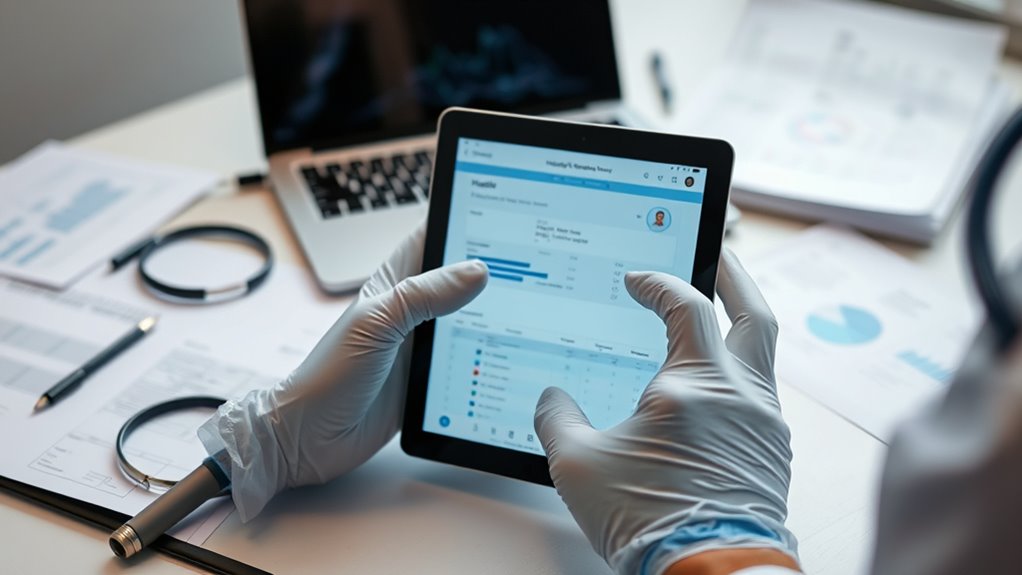To guarantee data accuracy in your health records, always verify patient identity by confirming key details like name and birth date before entering data. Follow standardized data entry protocols and double-check all information for errors or omissions. Regular training and validation tools can help spot mistakes early, reducing risks and maintaining high-quality records. Paying attention to these practices helps guarantee safe, effective care. Keep exploring to learn more about maintaining precise health information.
Key Takeaways
- Implement strict verification procedures, such as confirming patient identity with multiple identifiers before data entry.
- Follow standardized data entry protocols and review information carefully before saving to prevent errors.
- Regularly train staff on best practices for accurate data recording and updates within electronic health records.
- Utilize validation tools within EHR systems to detect inconsistencies, duplicates, or conflicting data early.
- Conduct periodic audits and cross-checks to maintain high data quality and address discrepancies promptly.

How accurate are your health records, and why does it matter? When your health information is precise, it directly impacts the quality of care you receive. Accurate records ensure that healthcare providers have the correct details about your medical history, medications, allergies, and treatments. This helps prevent errors, reduces redundant tests, and supports better decision-making. Conversely, inaccuracies can lead to misdiagnoses, incorrect treatments, or adverse drug interactions, which could jeopardize your health. That’s why maintaining data accuracy isn’t just a clerical task; it’s a critical part of quality healthcare.
Accurate health records are vital for safe, effective patient care.
One key aspect of data accuracy is patient verification. Before any information is entered or updated, verifying your identity guarantees that the data belongs to you. This process might involve confirming your name, date of birth, or other identifiers. Patient verification acts as the first line of defense against mix-ups, especially in busy medical practices or hospitals where numerous patients are seen daily. When verification is thorough, it reduces the risk of merging two patients’ records or entering incorrect details. It’s a simple step with a significant impact on data integrity.
Alongside patient verification, strict adherence to data entry protocols is essential. These protocols are standardized procedures that guide how healthcare providers input, update, and manage data within electronic health records (EHRs). They specify the format for entering information, the steps for reviewing data before saving it, and the importance of double-checking entries for accuracy. By following these protocols, you minimize human error, such as typos or omitted details, which can compromise record quality. Consistent data entry practices promote reliability and make it easier to retrieve accurate information when needed.
Implementing robust data entry protocols also involves regular staff training. When everyone involved in recording health information understands the importance of accuracy and knows the correct procedures, the likelihood of errors diminishes. Additionally, integrating validation tools within EHR systems can flag potential mistakes—like conflicting medication allergies or unusual lab results—prompting verification before finalizing entries. These safeguards help catch errors early, preventing them from becoming part of your permanent record.
Frequently Asked Questions
How Often Should I Review My Health Records for Accuracy?
You should review your health records at least once a year through regular check-ins to catch any inaccuracies. During these reviews, update your procedures by confirming all information is current, including medications, allergies, and recent visits. Regular check-ins help you stay on top of your health data, ensuring accuracy and consistency. Staying proactive with updating procedures guarantees your health records remain reliable and useful for future care needs.
Can I Correct Errors in My Health Records Myself?
Fixing errors in your health records is like untangling a knot—you can often do it yourself. Patient empowerment means you have the right to initiate a record correction process, ensuring your information is accurate. Contact your healthcare provider or the facility managing your records, follow their procedures, and submit any needed documentation. Taking charge of your records helps you stay informed and confident about your health data’s accuracy.
What Privacy Measures Protect My Health Data Accuracy?
Your health data is protected through privacy measures like data encryption, which safeguards your information from unauthorized access, and access controls that restrict who can view or modify your records. These safeguards ensure your data remains accurate and confidential. You can trust that healthcare providers and systems use these security measures to keep your health information safe, accurate, and private at all times.
How Do Discrepancies in Health Records Impact My Care?
Discrepancies in your health records, like data entry errors or communication gaps, can seriously impact your care by causing misdiagnoses or incorrect treatments. When errors go unnoticed, you might receive unnecessary tests or medications, delaying proper care. It’s essential to review your records regularly, communicate openly with your healthcare providers, and report any inconsistencies to guarantee your health information remains accurate and your treatment is effective.
Who Is Responsible for Maintaining Data Accuracy Across Providers?
You might think it’s all on your providers, but responsibility actually falls on them to maintain data accuracy. Provider accountability drives the process, ensuring data verification protocols are followed meticulously. Yet, don’t forget—you play a essential role too. Stay vigilant, ask questions, and verify your records. In this crucial chain, every link matters, because a single overlooked detail could have serious consequences for your care.
Conclusion
To keep your health records accurate, double-check your information regularly and communicate openly with your healthcare providers. Think of it as maintaining your own personal scriptorium—precision guarantees your health story stays true. Remember, even in this digital age, old-school vigilance is your best ally. Don’t let outdated details turn your health record into a misprinted manuscript; stay proactive and keep your health history clear, current, and reliable.








